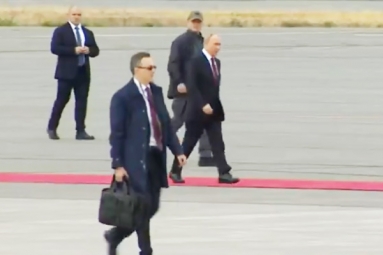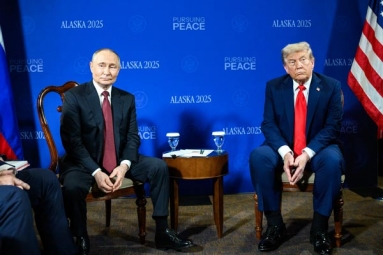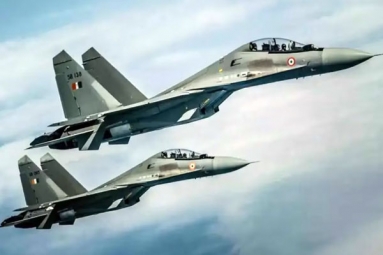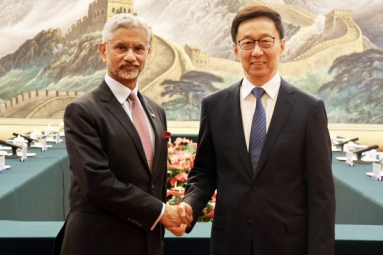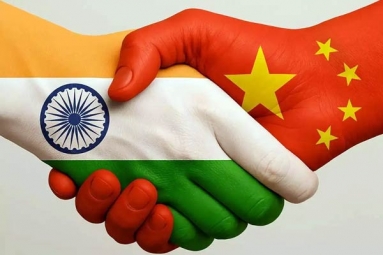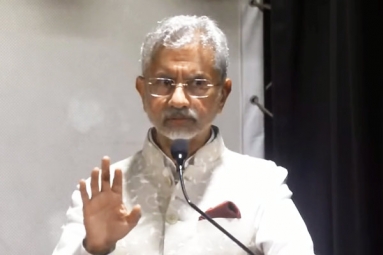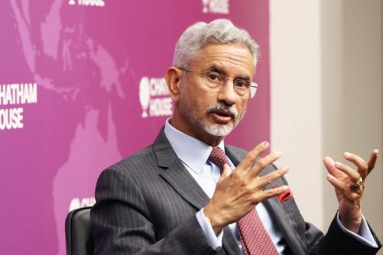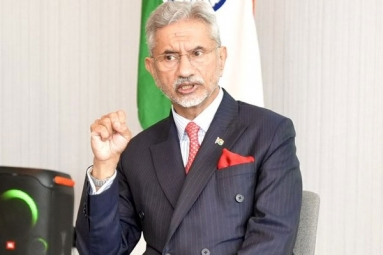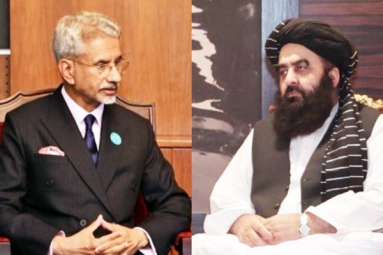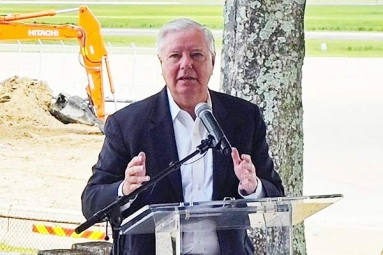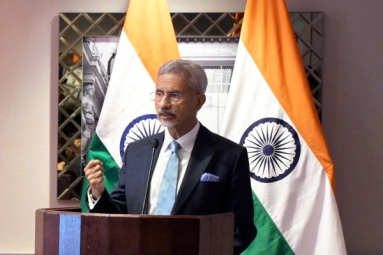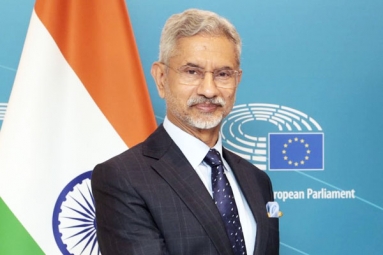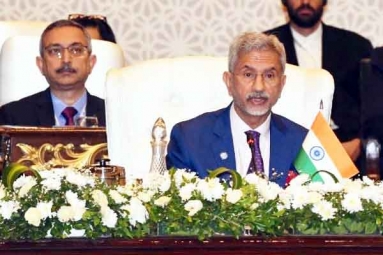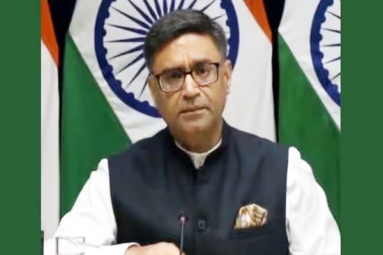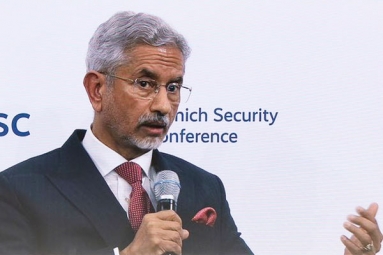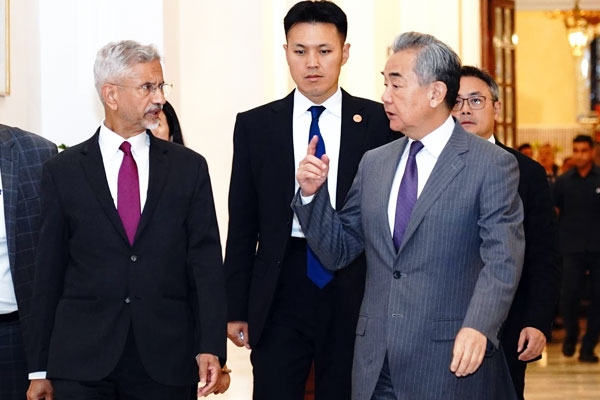
(Image source from: Twitter.com/DrSJaishankar)
Five years after their troops clashed in Galwan, India and China are trying to improve their relationship as the Donald Trump government in the US intensifies its trade war against India. Chinese Foreign Minister Wang Yi is visiting India and met with External Affairs Minister Dr S Jaishankar yesterday. This visit is significant as both countries work on enhancing their relationship to tackle the worldwide issues caused by Trump’s trade policies. During the meeting, Dr Jaishankar pointed out that Wang's visit offers a chance to reassess their connections. "After facing tough times in our relationship, Excellency, we both aim to progress. This calls for an honest and positive approach from both sides," he stated in the discussion. "In this effort, we should follow the three principles - respect for one another, sensitivity to each other’s needs, and shared interests. Our differences should not turn into arguments, and competition should not lead to conflict," the experienced diplomat mentioned.
Dr Jaishankar remarked that the discussions will touch on economic matters, trade topics, pilgrimages, connections between people, sharing river data, border trade, transportation links, and bilateral exchanges. Wang is set to talk about border issues with National Security Adviser Ajit Doval today. "This is crucial because having a positive relationship relies on both sides being able to keep peace and calm in border areas. It's also vital that the process of reducing tensions continues," Dr Jaishankar said yesterday. "Excellency, when the two largest countries meet, it’s normal for international matters to be on the table. We are aiming for a fair, balanced, and multi-polar global system, including a multi-polar Asia. There is a need for reformed approaches to international cooperation. In today's circumstances, it’s essential to maintain and strengthen stability in the global economy as well," he added. "Overall, we hope that our talks will help build a steady, cooperative, and forward-thinking relationship between India and China, which will benefit both our nations and address our concerns," Dr Jaishankar mentioned.
Welcomed Politburo member and Foreign Minister Wang Yi in Delhi this evening.
— Dr. S. Jaishankar (@DrSJaishankar) August 18, 2025
Highlighted that our relations are best guided by the three mutuals - mutual respect, mutual sensitivity and mutual interest. As we seek to move ahead from a difficult period in our ties, it needs a… pic.twitter.com/xRMYm4Nqpv
According to sources, China has agreed to tackle three important concerns for India - fertilizers, rare earth elements, and tunnel boring machines. Among these, rare earth elements are crucial for producing high-tech goods like smartphones and advanced military technology. Their concentrated production, mainly in China, makes them strategically important for global tech needs. A statement from China after the meeting indicated that Wang Yi informed Dr Jaishankar that the world is experiencing a "once-in-a-century transformation that is speeding up." While seemingly referencing the pressure from Washington, he remarked that "unilateral pressure is widespread" and that free trade and the international system are facing serious challenges. "As the two biggest developing nations with a total population exceeding 2.8 billion, China and India should show global awareness and responsibility as leading countries. They should set an example for many developing nations to come together and empower themselves, helping to promote a multi-polar world and a democratized international relationship," he stated.
The discussion held last year in Kazan between Prime Minister Narendra Modi and Chinese President Xi Jinping has resulted in a "restart in China-India relations." He mentioned that both nations have actively worked on the agreements made by their leaders, communication and discussions at various levels have started again, peace has been kept in the border regions, and Indian travelers have begun visiting the holy sites in Tibet again. This shows a good direction in China-India relations returning to a focus on cooperation. He also stated that China and India should build their trust, meet each other halfway, remove obstacles, broaden their collaboration, and strengthen the positive movement in China-India relations.
The improvement in India-China relations happens alongside the US imposing tariffs on India for its ongoing imports of Russian oil. The US has set a 50 percent tariff on exports from India, affecting many industries. India has pointed out that its oil purchases from Russia depend on market conditions and are meant to secure energy for its 1.4 billion citizens. Even though the US is penalizing India for buying Russian oil, it has not placed any secondary sanctions on China. US Secretary of State Marco Rubio explained that most of the Russian oil that China purchases is processed and then sold in the international market.
He stated, "If you were to impose secondary sanctions on a country, for instance, targeting the oil sales of Russian oil to China, China would just refine that oil. Then, that oil is sold globally, and anyone purchasing it would end up paying more, or, if that oil isn’t available, would have to look for another source."






